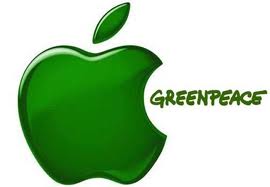 Jakarta, 12 April 2013: The World Business Council for Sustainable Development (WBCSD), which claims to be the “world’s foremost business association dedicated to sustainable development”, today warned Asia Pacific Resources International (APRIL), Indonesia’s second largest pulp and paper producer, to clean up its act. The move is a result of APRIL’s ongoing large-scale destruction of Indonesia’s rainforest.
Jakarta, 12 April 2013: The World Business Council for Sustainable Development (WBCSD), which claims to be the “world’s foremost business association dedicated to sustainable development”, today warned Asia Pacific Resources International (APRIL), Indonesia’s second largest pulp and paper producer, to clean up its act. The move is a result of APRIL’s ongoing large-scale destruction of Indonesia’s rainforest.“Being put on probation by this organisation is a humiliating blow to APRIL’s claims to practice sustainable forest management,” said Zul Fahmi, Forest Campaigner at Greenpeace South East Asia.
“The reality is that APRIL is now the largest driver of deforestation for pulp and paper in Indonesia. If it wants to stay in the WBCSD and needs to clean up the destruction we have documented time and time again.”
Such a move to crack down on its members is a first for the WBCSD, which this week prominently profiled Nestle zero deforestation policy and guides to help other companies avoid deforestation in their commodity sourcing on its home page.
Greenpeace investigations have shown that APRIL is clearing many thousands of hectares of peatland forests. These carbon-rich rainforests are vital not just for climate stability, but also as habitat for critically endangered Sumatran tigers and an internationally protected tree species, ramin. APRIL also has a long history of social conflicts with local communities.
Recent government data reveal that 60% of fibre supply to APRIL’s Riau Andalan Pulp & Paper (RAPP) pulp mill in Indonesia – one of the largest mills in the world – is rainforest wood. In 2012, APRIL planned to feed its Sumatran pulp mill by clearing another 60,000 hectares of rainforest – an area nearly the size of Singapore.
“Earlier this year APP, the largest pulp and paper company in Indonesia, committed to end its role in deforestation in Indonesia. It’s time for APRIL to recognise how out of step it is with the rest of the global business community and immediately join APP to end its involvement in deforestation,” said Zul.
Greenpeace International approached WBCSD in February with findings from investigations exposing the conflict between APRIL’s deforestation and WBCSD’s environmental principles. This is in addition to requests from a significant number of peer companies in the WBCSD and from NGO groups who pushed for a review of APRIL.
